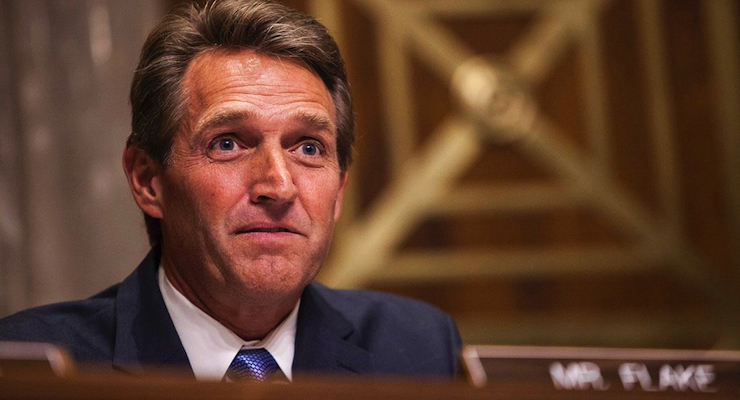

U.S. Senator Jeff Flake, R-Ariz., during a Feb. 5, 2015 hearing in the Senate. (Photo: Getty)
PHOENIX – Sen. Jeff Flake, R-Ariz., announced Saturday that he would vote “no” on the Iran nuclear agreement negotiated by the Obama administration, killing any hope for bipartisan support. Flake, who has repeatedly praised President Barack Obama for attempting to reach a diplomatic solution with the regime in Tehran, was the sole Republican senator who was seriously considering whether to support the Iran deal.
“When the administration announced that an agreement had been reached between the P5+1 and Iran, I said that I would take the time to do due diligence on the deal. I have tried to do so,” Flake said in a statement. “While I have supported the negotiations that led to the JCPOA from the beginning, I cannot vote in support of this deal.”
The White House declined to comment on Flake’s decision, but claim they will continue to attempt to persuade other Republicans to back the deal. However, Senate vote-counters had considered Flake the only undecided GOP vote–though fellow Republicans had expressed confidence he would oppose it–and it is highly unlikely they will find a single vote in the House, either.
President Obama claims the deal with Iran will curb its nuclear program in exchange for relief from international sanctions that have crippled its economy. Administration officials have repeatedly said that nuclear-related sanctions imposed on Iran would be lifted over a number of years, and that other sanctions aimed at Tehran’s sponsorship of terrorism, its human rights abuses or its ballistic missile program would remain in place.
However, Flake, as well as voters, simply do not believe that to be the case. In a statement issued while Congress was on its annual August recess, Flake said he was concerned that the deal severely limits lawmakers’ ability to sanction Iran for activities unrelated to its nuclear program. Obama has argued that multilateral sanctions under the United Nations umbrella will be lifted under the deal, but that the U.S. will retain sanctions punishing Iran for other issues like human rights and its support for extremist groups like Hezbollah.
“The JCPOA does contain benefits in terms of limiting Iran’s ability to produce sufficient fissile material for a nuclear weapon for a period of time, particularly at its known nuclear facilities. But these benefits are outweighed by severe limitations the JCPOA places on Congress and future administrations in responding to Iran’s non-nuclear behavior in the region,” Flake said. “While Congress has received assurances from the administration that it does not forfeit its ability to impose sanctions on Iran for behavior on the non-nuclear side, these assurances do not square with the text of the JCPOA.”
In total, 20 Senate Democrats have backed the deal, while one–New York Sen. Chuck Schumer, likely the next Democrat Senate leader–announced recently he would oppose it. Forty-six House Democrats have supported the deal, compared to 10 who are opposed.
Flake had been the target of weeklong barrage of attack ads running in Phoenix featuring a former soldier wounded in Iraq by an Iranian-made bomb. The soldier, whose face is badly scarred, said those who vote for the deal will “be held accountable.”
“They will have blood on their hands,” the soldier said in the ad.
Public polls show support for the Iran deal is weak, at best, while the opposition has held steady. A recent FOX Poll of 1008 registered voters finds 58 percent of Americans would vote against the Iran nuclear agreement if they were in Congress, while only 31 percent said they would vote in favor of it. PPD tracking shows that–on average–58 percent of Americans oppose the deal, which mirrors the FOX Poll, but an even lower percentage (29 percent) on average are supportive. Interestingly, Americans express a willingness to support a deal with the largest state-sponsor of terrorism, just not the one Obama and Secretary of State John Kerry negotiated.
The reason for opposition has been equally consistent and two-fold–no one believes Iran will keep their end of the deal or that it will make the world/region a safer place. Whether or not enough lawmakers will agree to override the president’s veto remains to be seen. Congress has until Sept. 17 to vote on a resolution either approving or disapproving the pact. Although Obama doesn’t need explicit congressional approval for the deal, the resolution could scuttle the deal by blocking Obama’s ability to lift harsh economic sanctions — the key concession that got Iran to agree to the deal.






